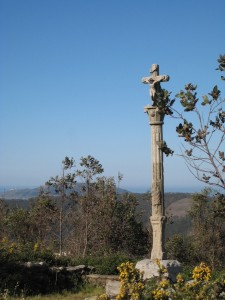
“Isn’t all that walking boring?”
It wasn’t the first time I’d been asked that, and I understood the question. After all, walking is just…well…walking. It’s slow, repetitive and not particularly cool or sexy.
All I can say is no, it’s never boring for me. Sometimes it’s hard. Sometimes it’s exhausting. But I’ve never found it boring. My mind, which can judge activities and label them as interesting or dull, is lulled by walking, and even at times released by it. Walking gives my mind a freedom it achieves nowhere else, as I describe in the book.
My compañero from the Camino Francés sent me the following words from teacher, poet and peace activist, Thich Nhat Hanh. I love them because they describe a state I long to achieve in all areas of my life. I trust that it might one day be possible, because I can achieve something like it when I walk. See if you can get your mind to attend to every word. It’s not easy.
To my mind, the idea that doing the dishes is unpleasant can occur only when you are not doing them. Once you are standing in front of the sink with your sleeves rolled up and your hands in warm water, it really is not so bad. I enjoy taking my time with each dish, being fully aware of the dish, the water, and each movement of my hands. I know that if I hurry in order to go and have a cup of tea, the time will be unpleasant and not worth living. That would be a pity, for each minute, each second of life is a miracle. The dishes themselves and the fact that I am here washing them are miracles! Each bowl I wash, each poem I compose, each time I invite a bell to sound is a miracle, each has exactly the same value. One day, while washing a bowl, I felt that my movements were as sacred and respectful as bathing a newborn Buddha. If he were to read this, that newborn Buddha would certainly be happy for me, and not at all insulted at being compared with a bowl.
So, in direct answer to the question about walking, and begging forgiveness from the wise teacher, please consider the following, knowing that your mind will try even harder not to attend!
To my mind, the idea that walking is unpleasant can occur only when you are not doing it. Once you have put on your dusty boots, and loaded your pack onto your back, it really is not so bad. I enjoy taking each step, being fully aware of my foot on the earth, the landscape, and each movement of my chest as I breathe. I know that if I hurry in order to get to the finish line, the time will be unpleasant and not worth living. That would be a pity, for each minute, each second of life is a miracle. The steps themselves, and the fact that I am here taking them, are miracles! Each kilometre I travel, each song I sing, each time I let my arms swing past my hips, is a miracle, each has exactly the same value. One day, while walking, I felt that my movements were as sacred and respectful as bathing a newborn Buddha. If he were to read this, that newborn Buddha would certainly be happy for me, and not at all insulted at being compared with walking.
I hope the venerable Thich Nhat Hanh, and my compañero, will not feel at all insulted at my rephrasing of that beautiful text.
Chop wood. Carry water. Wash dishes. Bathe newborn Buddha. Walk.
Peace.
Peace was the wish made by my amigo in Baños de Montemayor.
Paz.
It was a wish made by many of us at last week’s conversation with Tony Doherty. If you’d like to view the YouTube clip of that, please bear in mind that we take up the first 75 or so minutes of the 100 min total. Also bear in mind that our conversation took place the day after George Pell’s press conference about the abuse of children within the church, and as a result the talk is coloured by that.
The last thing I ask you to bear in your wonderful mind is gratitude – to all who read these offerings, and in particular, to all who attended that night. It was humbling – and painful – to hear some of your stories afterwards, and I am walking with you in my heart.
Paso a paso. Step by step.














